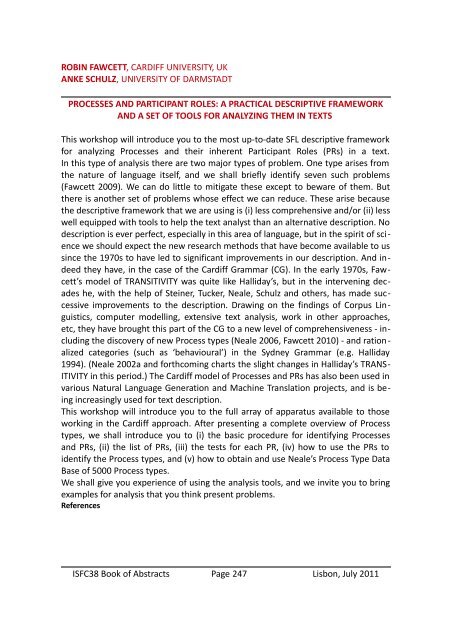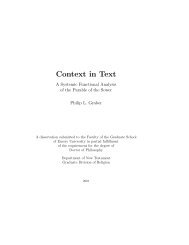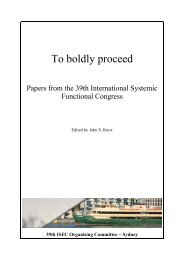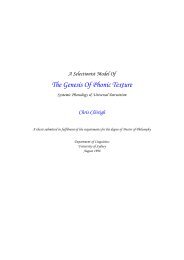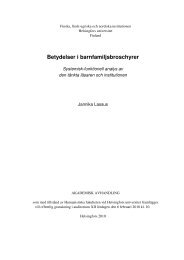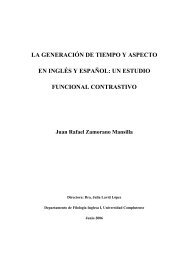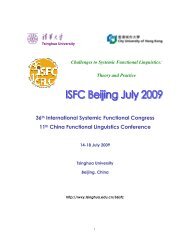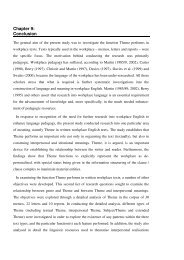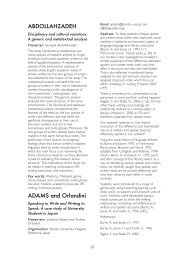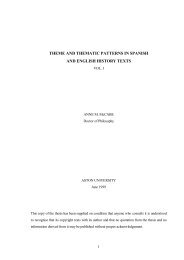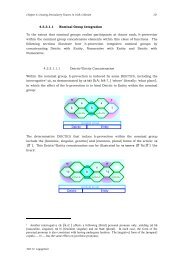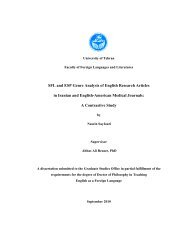Abstracts - Faculdade de Letras da Universidade de Lisboa
Abstracts - Faculdade de Letras da Universidade de Lisboa
Abstracts - Faculdade de Letras da Universidade de Lisboa
- No tags were found...
Create successful ePaper yourself
Turn your PDF publications into a flip-book with our unique Google optimized e-Paper software.
ROBIN FAWCETT, CARDIFF UNIVERSITY, UKANKE SCHULZ, UNIVERSITY OF DARMSTADTPROCESSES AND PARTICIPANT ROLES: A PRACTICAL DESCRIPTIVE FRAMEWORKAND A SET OF TOOLS FOR ANALYZING THEM IN TEXTSThis workshop will introduce you to the most up-to-<strong>da</strong>te SFL <strong>de</strong>scriptive frameworkfor analyzing Processes and their inherent Participant Roles (PRs) in a text.In this type of analysis there are two major types of problem. One type arises fromthe nature of language itself, and we shall briefly i<strong>de</strong>ntify seven such problems(Fawcett 2009). We can do little to mitigate these except to beware of them. Butthere is another set of problems whose effect we can reduce. These arise becausethe <strong>de</strong>scriptive framework that we are using is (i) less comprehensive and/or (ii) lesswell equipped with tools to help the text analyst than an alternative <strong>de</strong>scription. No<strong>de</strong>scription is ever perfect, especially in this area of language, but in the spirit of sciencewe should expect the new research methods that have become available to ussince the 1970s to have led to significant improvements in our <strong>de</strong>scription. And in<strong>de</strong>edthey have, in the case of the Cardiff Grammar (CG). In the early 1970s, Fawcett’smo<strong>de</strong>l of TRANSITIVITY was quite like Halli<strong>da</strong>y’s, but in the intervening <strong>de</strong>ca<strong>de</strong>she, with the help of Steiner, Tucker, Neale, Schulz and others, has ma<strong>de</strong> successiveimprovements to the <strong>de</strong>scription. Drawing on the findings of Corpus Linguistics,computer mo<strong>de</strong>lling, extensive text analysis, work in other approaches,etc, they have brought this part of the CG to a new level of comprehensiveness - includingthe discovery of new Process types (Neale 2006, Fawcett 2010) - and rationalizedcategories (such as ‘behavioural’) in the Sydney Grammar (e.g. Halli<strong>da</strong>y1994). (Neale 2002a and forthcoming charts the slight changes in Halli<strong>da</strong>y’s TRANS-ITIVITY in this period.) The Cardiff mo<strong>de</strong>l of Processes and PRs has also been used invarious Natural Language Generation and Machine Translation projects, and is beingincreasingly used for text <strong>de</strong>scription.This workshop will introduce you to the full array of apparatus available to thoseworking in the Cardiff approach. After presenting a complete overview of Processtypes, we shall introduce you to (i) the basic procedure for i<strong>de</strong>ntifying Processesand PRs, (ii) the list of PRs, (iii) the tests for each PR, (iv) how to use the PRs toi<strong>de</strong>ntify the Process types, and (v) how to obtain and use Neale’s Process Type DataBase of 5000 Process types.We shall give you experience of using the analysis tools, and we invite you to bringexamples for analysis that you think present problems.ReferencesISFC38 Book of <strong>Abstracts</strong> Page 247 Lisbon, July 2011


